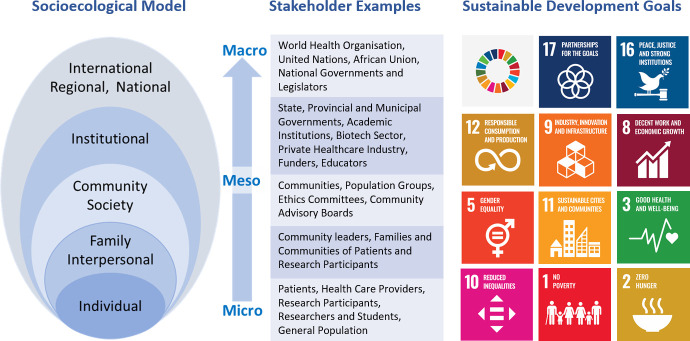Building Equity into Research: Practical Ways to Share the Benefits
This blog post explores how researchers can build equity and sustainability into their work by sharing the benefits of research in meaningful, practical ways. Drawing on a socio-ecological model, it highlights options like training and capacity building, investing in local infrastructure, collaboration with primary data generators, and strengthening health systems. By thinking beyond financial benefits, researchers can ensure that individuals, institutions, and communities that contributed to creating research resources also share in the gains, helping to build long-term capacity, trust, and impact.

Sharing Research Means Sharing Benefits
At ADBEx, we believe that sharing data and biospecimens is only one part of responsible research. True impact also comes from making sure that the benefits of research are shared fairly, especially with the people, institutions, and communities that contributed to creating those resources in the first place.
Benefit sharing isn’t just about financial rewards. In fact, some of the most sustainable and equitable benefits come from capacity building, collaboration, and knowledge exchange, things that can strengthen African science for the long term.
Four Practical Ways to Build Benefit Sharing into Your Research
1. Support Skills Development & Training
Benefit sharing can start with building local expertise. For example:
- Train postgraduate students in advanced lab or data analysis techniques.
- Host joint workshops or mentorship programs.
- Offer research internships to early-career scientists from the resource-contributing institution.
Even better: bring the training to Africa. Instead of flying samples or data to labs overseas, fund in-country training in those same techniques.
2. Invest in Local Infrastructure
Instead of relying only on international labs, researchers can:
- Install equipment locally for sequencing, biobanking, or high-performance computing.
- Strengthen lab or data infrastructure at hospitals or universities.
- Support administrative or regulatory systems to manage shared research.
These kinds of investments have a multiplier effect, benefiting not just one project, but whole departments or institutions.
3. Collaborate, Don’t Extract
Collaboration is a powerful form of benefit sharing. When you involve primary data generators in the next phase of research, you enable:
- Co-authorship and visibility on new publications
- Shared leadership in research design, interpretation, and dissemination
- Opportunities for joint funding applications and follow-on projects
Working together ensures that benefits don’t just flow in one direction, they’re co-created.
4. Strengthen Local Health Systems
Your project could help build capacity in hospitals, labs, or clinics, especially when research overlaps with service delivery. For example:
- Share findings with local healthcare providers.
- Co-develop protocols or tools that can be integrated into clinical care.
- Return meaningful results (where appropriate) to participants or communities.
Why This Matters for Equity and Sustainability
By sharing benefits thoughtfully and intentionally, we:
- Avoid extractive research practices
- Build trust with communities and institutions
- Grow African research capacity, one project at a time
This approach doesn’t just check a box — it raises the standard for what global health research can look like: fairer, smarter, and more sustainable.
ADBEx encourages researchers to actively think about benefit sharing as part of their resource sharing plans. Whether you're building a partnership, submitting a project, or sharing data, there are many ways to ensure benefits are equitably distributed and locally felt.
Want to Learn More?
This blog post is based on the article:“A framework for the promotion of ethical benefit sharing in health research” – Bedeker et al. (BMJ Global Health, 2022)Read the full article here:
No listings found
Try broadening your search parameters